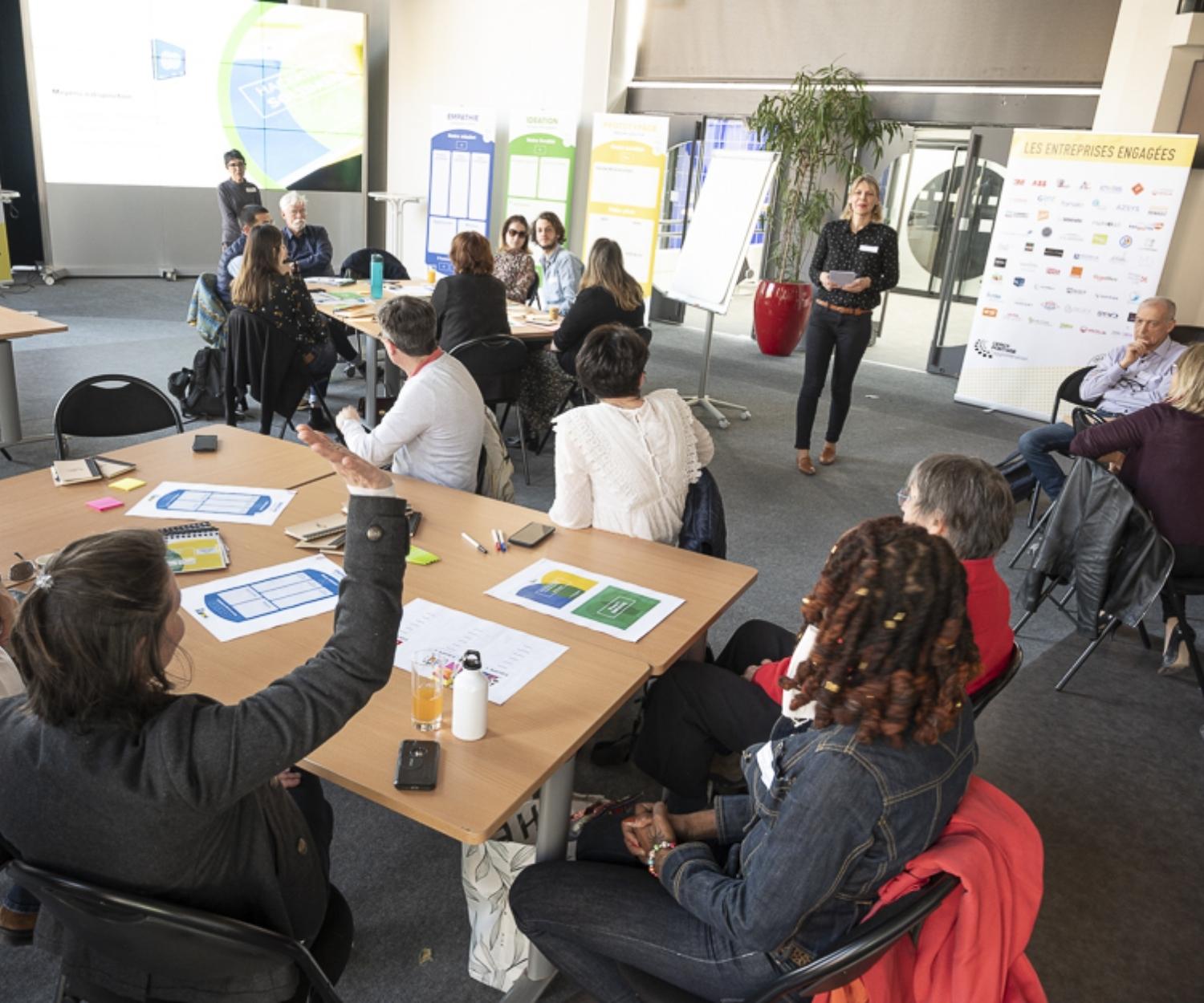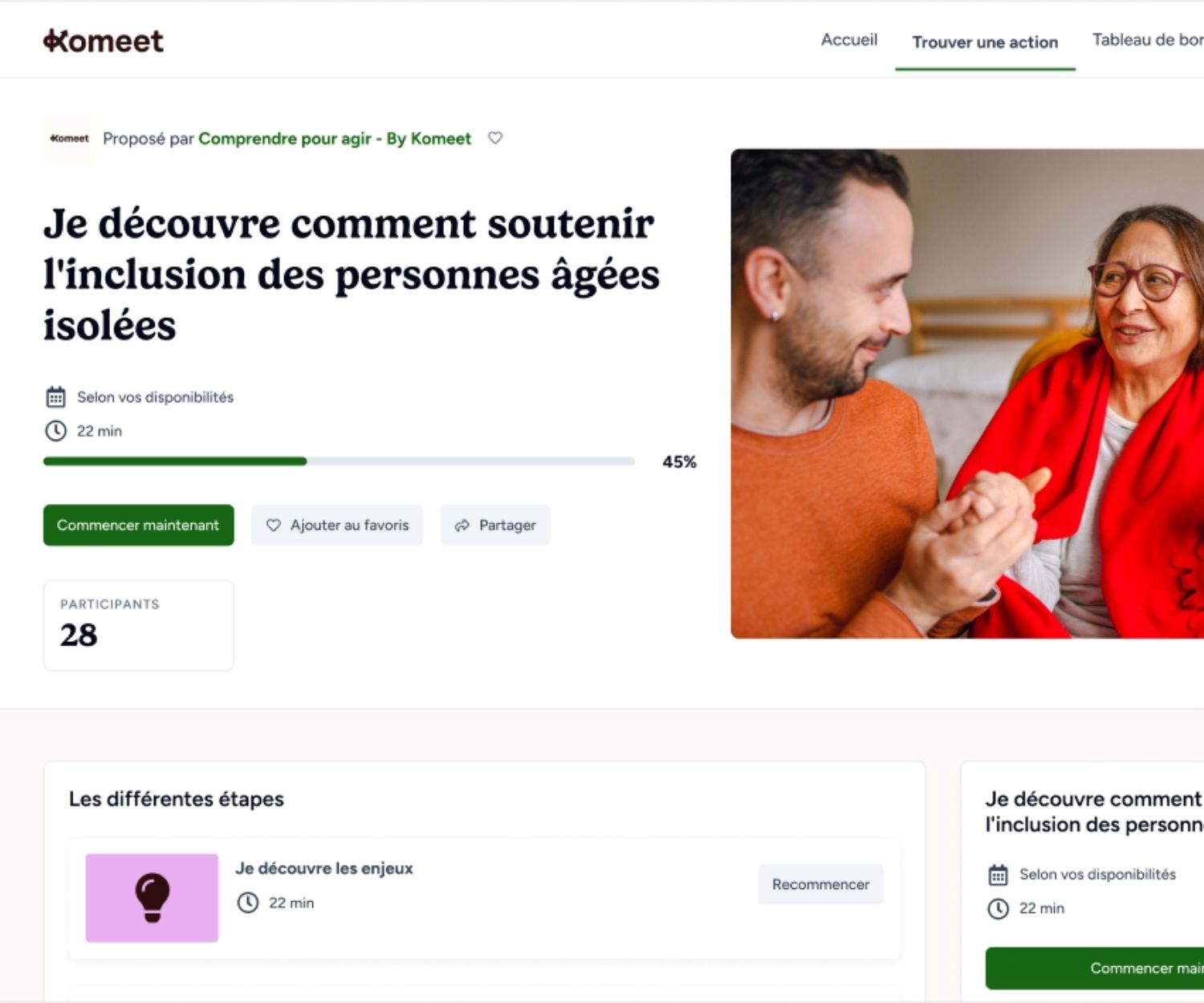Loss of meaning at work: how can a company remedy it?
Loss of meaning at work, brown-out, quiet quitting... These terms, which have multiplied in recent years, reflect the need for employees to feel useful on a daily basis in their work. According to Jobs That Make Sense, 92% of employees are looking for more meaning in their professional life in 2022. Discover how to respond to your employees' quest for meaning in this article!

What is the loss of meaning at work?
42% of French people say they no longer find meaning in their work
Factorial, 2021
The loss of meaning at work was defined by François Baumann in his book”Brown-out: when work no longer makes sense” as being “an exhaustion of the individual by the absurdity of what he does”. This is a syndrome called “brown-out”, which is translated as “a drop in blood pressure.” This syndrome leads to moral resignation and can have impacts on mental and physical health.
Several factors can cause this loss of meaning at work. It can come from a trigger such as a project that is difficult to carry out or simply from the work itself: let's mention “bullshit jobs”, a concept theorized by the anthropologist David Graeber which refers to an empty job that causes suffering for the employee.
As Edgar Morin wrote: “Meaning at work is often never as essential as when it is lacking.” Psychologist Sylvie Chauvin, during a Komeet x moka.care webinar, recalled Aaron Antonovsky's model of salutogenesis, which identifies three fundamental criteria:
- Comprehension : to know what is happening and to understand the decisions and directions of the company;
- Control : to have the feeling that you have room for maneuver, even minimal, over what happens;
- Meaning : to perceive that one's work contributes to something more global and meaningful.
When these three dimensions are lacking, employees are more exposed to the loss of meaning and Brown-out.
In 2022, France experienced a phenomenon of great resignation, with 520,000 people who decided to resign in the first quarter of that same year (DARES).
Since then, wage compensation seems insufficient to convince employees to keep their jobs. Many of them now decide to change jobs in the hope of finding a sense of usefulness in their work. The fact of resigning because a job does not correspond to the social and environmental values of the employee also has a name: it is Conscious Quitting.
The lack of recognition and appreciation that an employee may experience, unrealistic goals, the installation of a monotonous routine or the lack of autonomy and freedom are the main causes of the loss of meaning at work.
The loss of meaning at work is also one of the reasons for the broad wave of Quiet-Quitting that we have (and continue to) know: discouraged employees thus decide to achieve only the bare minimum.
What are the symptoms of brown-out?
The loss of meaning at work has specific symptoms that should not be underestimated, because it can have repercussions both on employees and on the company!
Among these signs that may indicate a possible loss of meaning in the work of employees:
- Difficulty concentrating and attention disorders;
- A tendency to procrastinate;
- A growing boredom that annihilates any initiative on the part of the employee;
- Or a lack of investment and a negligence in the accomplishment of missions.
But luckily, solutions exist to give meaning to employees who find themselves in this situation.
The role of the company in the search for meaning for employees
Giving meaning to the work of your employees makes it possible to motivate and retain them, but also to attract new talent.
To respond to their search for meaning and thus improve your employer brand, several paths can be explored:
- Create a corporate culture centered on the respect and dignity of the individual;
- Valuing the work of employees;
- Or even align the company's internal and external discourses.
The solutions are multiple and the search for meaning covers various aspects of the employee experience. We invite you to discover different levers that promote meaning at work!
1. Communicate and promote the usefulness of work
For everyone to find meaning in their work, it is essential to understand how the company exists and what it contributes to. The purpose and the mission constitute this course: they allow each individual task to be integrated into a larger purpose, which makes sense.
Sharing this vision on a regular and transparent basis, whether during team meetings or in internal communications, helps employees to project themselves and understand the global impact of their work.
Then, it is a question of giving concrete anchor points: connecting missions to strategic objectives, valuing collective successes, recognizing individual contributions. Regular feedback, career prospects and fair remuneration reinforce this feeling of usefulness and consistency.
The DARES (Department for the Coordination of Research, Studies and Statistics of the Ministry of Labor) emphasizes that “the expression of full potential” also plays an important role in the meaning given to work. Everyone must be able to develop their skills and make full use of them: skills sponsorship, access to training, a change of position or even career progression are all ways to explore.
2. Develop the ability to listen and the sense of belonging of employees for a serene climate
Attention to the needs, difficulties, but also the successes of each employee is a way of avoiding conflicts and creating a climate of trust. For this, you can opt for regular individual interviews!
Inviting employees to participate fully in the daily functioning of the company also helps to develop their sense of belonging and thus to respond to their quest for meaning.
It is also important to involve them in the company's CSR policy to create a sense of belonging. This will involve various initiatives such as skills sponsorship, participation in information conferences on causes supported by the company or even fundraisers. This is aboutinitiatives that meet the requirements of the new generation and that would make the positions more attractive for them. Indeed, the new generation wants to join a company whose values are aligned with their own.
These actions particularly meet the expectations of the younger generations (Millennials, born between 1980 and 1995, and Generation Z, born after 1996). 90% of Generation Z members and 87% of Millennials in France consider the meaning of work to be essential for their professional development
deloitte, 2025
These figures show that in order to attract and retain these profiles, it is essential for the company to show clear and concrete commitments, in line with their aspirations.
3. Ensuring personal and professional balance
Separating professional life and personal life contributes to the development of everyone and has become a criterion of choice: 36% of employees check the possibility of having a balance between their professional life and their personal life before joining a company (1st Sense & Work Assises, 2022). To make daily professional life fulfilling, it is essential to avoid soliciting employees outside of working hours or during their holidays except in case of emergency. You can add to this several other arrangements: flexible hours, teleworking days, additional vacation days, etc.
Companies can also give their employees a certain number of days so that they can engage with causes that are dear to them. This offers more time and opportunities for employees to devote themselves to it.
4. Foster cooperation and develop collective intelligence
Cooperation, mutual aid and support are also essential for professional development. An increasingly common solution in business: team building. It facilitates team cohesion, collaborative work and develops collective intelligence.
Solidarity team-building has that little extra touch that aims to gather around an activity with a strong social or environmental impact. The ideal opportunity for your teams to come together around a cause that is important to them!
For example, Komeet facilitated with KCO the realization of team building workshops for Covivio during SoCoVivio week in July 2022. During this cohesion week, around 250 hours of volunteering were carried out! Nearly 90 employees were involved in this societal project, by participating in various activities such as field missions, coaching sessions or even skills sponsorship, with associations Pik Pik Environment, Wake up Café and The Solidarity Tie.
5. Involve employees in a social commitment program
As we mentioned, uniting employees around CSR and company values is also a good way to fight against the loss of meaning at work. How? By involving them, for example, in a social engagement program.
Komeet promotes the social commitment of companies by supporting them in the definition and animation of their commitment program. Our platform offers employees the possibility to easily engage with associations on field missions to be carried out on their working time and outside.
90% of employees believe that getting involved has given more meaning to their daily lives.
Overview of societal commitment, 2025, Comet
As for businesses, encouraging this mobilization makes it possible to strengthen their social and environmental commitments.
Thus, the role of the company in defining the meaning of work is essential. When we ask employees about their loss of meaning, we find many elements correlated to the organization of the company. The company is the only one that can act in depth, since it defines not only its vision and values, but also the way in which it transmits them to its employees.
Also to read:
Employee experience: 4 tips for developing it
Health at work: the importance of QVCT
Examples of companies that give meaning to work through societal commitment
Komeet helps companies to concretely involve their teams in their engagement process. We invite you to discover some examples of companies that have successfully completed their engagement program with our support!
The example of Groupama
Bénédicte Crété-Dambricourt, HR Director of the Groupama group, affirms that the implementation of the “Donation of days for young people in professional integration” operation (which gave employees the opportunity to donate 1 to 5 days of leave to an association), required real teamwork and allowed them to unite around common values.
This type of action met a strong demand from employees and the group was able to listen! The employees were delighted to live this experience and to see their company carry values that are dear to them.
The figures bear witness to this: a 1,300 day donation to 17 associations was made!
Together, we then built the process to make the payment of donations viable. A great example of collaboration around a solidarity action.
- Bénédicte Crété-Dambricourt, HR Director of the Groupama group
The example of CFM
CFM teams attach great importance to equal opportunities. That's why their engagement program focuses on inclusion, especially for women and disadvantaged populations.
One of the program's initiatives is the GivingBack @CFM platform, which connects associations and collaborators. They have one working day per year to support the association of their choice.
These initiatives invite employees to invest in the company while being committed. They need to be worn by each team and also allow you to create strong moments with each other. In addition to this positive effect on teamwork, these efforts allow the company to carry important values for employees, giving them the opportunity to defend them in their work!
This type of initiative should not only be led by an HR or CSR department but should be carried out in each team.
- Mathilde Savalle, HR Development Associate at CFM
Giving meaning back to work is one of the major missions of companies today. Social commitment and skills sponsorship are concrete solutions to respond to employees' quest for meaning. This practice offers employees the opportunity to occasionally help associations working for causes that are important to them through their company, thus allowing them to regain a sense of usefulness on a daily basis. As for the company, it is an opportunity for it to strengthen its values and unite its teams by mobilizing them around the causes it wishes to promote!
In addition to Groupama and CFM, many companies supported by Komeet are also taking concrete actions. Discover our customer cases.
Giving back meaning, concretely with Komeet
Chez Komeet, we support companies that want to (re) give meaning to work by involving their teams in high-impact societal actions.
Thanks to our platform, each employee can easily engage, according to their desires and availability, on solidarity missions offered by hundreds of partner associations. A concrete way to transform the search for meaning into a collective and impactful experience.




